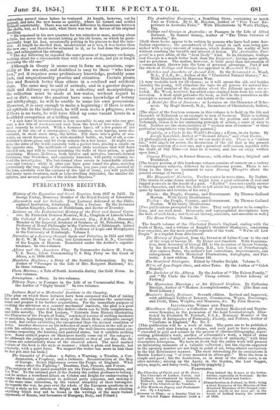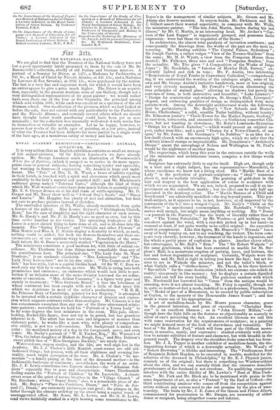PUBLICATIONS RECEIVED.
Boons.
History of the Byzantine and Greek Empires, from 1057 to 1453. By George Finlay, Honorary Member of the Royal Society of Literature.
Alexandria and her Schools. Four Lectures delivered at the Philo- sophical Institution, Edinburgh. With a Preface. By the Reverend Charles Kingsley, Canon of Middleham, and Rector of Eversley.
Lectures on the Ecclesiastical History of the First and Second Centu- . ries. By Frederick Denison Maurice, M.A., Chaplain of Lincoln's Inn.
The Collected Works of Dugald Stewart, Esq., F.R.S.S., Honorary Member of the Imperial Academy of Sciences at St. Petersburg, &c., Professor of Moral Philosophy in the University of Edinburgh. Edited by Sir William Hamilton, Burt.; Professor of Logic and Metaphysics in the University of Edinburgh. Volume I.
Narrative of a ,Tourney through Syria and Palestine, in 1851 and 1852. By C. W. M. Van de Velde, late Lieutenant Dutch It. N., Chevalier of the Legion of Honour. Translated under the Author's superin- tehdence. In two volumes.
Africa and the American _Flag. By Commander Andrew H. Foote, U. S. Navy, Lieut. Commanding U. S. Brig Perry on the Coast of Africa, A.D. 1850-1851.
Magdalen Hepburn ; a Story of the Scottish Reformation. By the Author of "Passages in the Life of Mrs. Margaret Maitland," &c. In three volumes.
Clara Morison; a Tale of South Australia during the Gold Fever. In two volumes.
Jerninghant : a Story. In two volumes.
Tilbury Nogo ; or Passages in the Life of an Unsuccessful Man. By the Author of "Digby Grand." In two volumes.
Lectures Read at a Mechanics' Institute in the Country.
[The plan on which these lectures have been composed was that of taking the most striking features of a subject, so as to stimulate the uninformed mind and prepare it for further acquisitions. For the immediate purpose of exciting the attention at a country mechanics' institute, the plan is a good one, in a critical sense it has this defect—there can be little completeness, and little novelty. The first Lecture, "Extracts from History illustrating the Character of the People of India," consists of a series of striking incidents or anecdotes, beginning with the story of the Black Hole ; attractive enough to read, •but rather exhibiting the exceptional than the normal condition of Incha. Another discourse on the influence of man's relation to the soil as re- gards his subsistence is useful, presenting the well-known economical con- clusions respecting the hunting and pastoral states, but it exhibits nothing new. Some critical papers on Shakspere hardly come out of the category ; far although the judgment is not so encomiastic as that of our day, the ob- jections are substantially those of the classical school. The most marked teature of the book is the style or manner ; which is plain and homely, but scholarly, with a quiet force. We suspect the writer has more in him than he has put into his book.]
The Gauntlet of Freedom : a Satire, a Warning, a Treatise, a Con- demnation, a Prophecy, and a Defiance. Reconstruction of the Map of Europe. Secret Diplomacy versus the People of England. What
comes after the Fighting ? Treatises, Past, Present, and Future. [The subjects of this quasi-pamphlet are the Peace Society, Romanian], and the War. To the rational part of the Society the author professes to belong; and he makes a trenchant attack on Cobden and Bright for endeavouring to render the Society subservient to political party purposes, and making it at the same time ridiculous, by the violent absurdity of their hatangues. As regards the war, he goes over the whole of the European questions in as strong a style as his attacks on Bright and Cobden ; but without eliciting anything which may not be found in the writings of the more violent opponents of Russia, and favourers of Hungary, Italy, and Poland.]
The Australian Emigrant; a Rambling Story, containing as much Fact as Fiction. By G. H. Hayden, Author of "Five Years' Ex- perience in Australia Felix." With Illustrations by Watts Phillips, Esq.
Gallops and Gossips in Australia; or Passages in the Life of Alfred Barnard. By Samuel Sidney, Author of "The Three Colonies of Australia," &c.
[Both these books appear to be written by persons who have had some Aus- tralian experience; the groundwork of the actual in each case being gar- nished with a large amount of romance, which destroys the reality of fact without reaching the breadth and interest of fiction. The Australian Etni- grant is a poor affair, of the "dead lively" kind. In its literature, Gallops and Gossips is a much better book than the Emigrant; having more spirit, and no prosiness. The matter, however, is little more than information of a common kind, thrown into the form of personal adventure. Part if not the whole of Gallops and Gossips has appeared in Household Words.]
Sketches and Anecdotes of Animal Life. By the Reverend J. G. Wood, M.A., F.L.S., &e., Author of the "Illustrated Natural History," &c. With Illustrations by Harrison Weir.
[A very readable book for all classes; as it will amuse the old, and besides amusing the young, will stimulate the taste we all possess for natural his- tory. A good number of the anecdotes about the different species are se- lected. Mr. Wood, however, has added some original facts from his own ob- servation. A fresh spirit pervades the book, as well in the narratives as the descriptive account of the nature and habits of the animals.]
A Model for Hen of Business ; or Lectures on the Character of Nehe- miah. By Hugh Stowell, M.A., Incumbent of Christchurch, Salford, &c.
[The object of the fourteen sermons in this volume is to hold up the life and character of Nehemiah as an example to men of business. There is nothing peculiarly applicable to Lancashire traders in the position and conduct of Nehemiah, unless it be his animating principle of action, a sense of duty to God. Neither are the characteristics of "modern men of business" or their particular temptations very forcibly painted.] Trephely, or a Cycle in the World's Destiny ; a Poem, in six books. By Joseph Longland, Author of "Bernard Alvers," and other Poems. [A philosophical poem—as well as we can make it out. There is a "sinless isle," with angels for actors, the destruction of the old that is the present world, the creation of a new one, and a promised millennium, together with the death of Old Time—at least he is buried, and has an elegy written upon him.] Passing Thoughts, in Sonnet Stanzas ; with other Poems, Original and Translated.
[The larger portion of this handsome volume consists of sonnets on a variety of contemporary subjects, followed by miscellaneous poems. There is no- thing in the ideas or treatment to raise Passing Thoughts above the general average of verses.] The Haymakers' Histories. Twelve cantos in terza rima. By Thither. [The stories of some dozen rustics might form a good collection of real and rugged pastorals in the hands of a poet. "Ruther " does not exactly answer to this character, and often has little to tell about his persons; filling up the space by fancies and reveries of his own.] Russia : the People, Country, and Government. By Thomas Galland Horton. With thirty Illustrations.
Turkey : the People, Country, and Government. By Thomas Gallen(' Horton. With thirty Illustrations. [Two publications prompted by the time. They only profess to be compila- tions and are well done. Geography and topographical descriptions form the bulk of each book ; but there are history, statistics, and anecdote as well.] The Rome Circle. Volume N.
The fourth volume of the illustrated Hume's England, ending with the death of Mary, and a volume of Knight's Stratford Shakspere, containing four comedies, are the most notable reprints of the week. " We're all Low People" is a reprint from Blackwood.
The History of England, from the Invasion of Julius Cesar to the end of the reign of George II. By Hume and Smollett. With Continua- tion, from Accession of George III. to the Accession of Queen Victoria, by the Reverend T. S. Hughes, B.D., late Canon of Peterborough. Also copious Notes, the author's last corrections, improvements, and enlargement.. With Historical Illustrations, Autographs, and Por- traits. A new edition. Volume III.
The Stratford Shakspere. Edited by Charles Knight, Volume V. We're all Low People there, and other Tales. By the Author of" Caleb Stukely."
The Bachelor of the Albany. By the Author of "The Falcon Family," and "My Uncle the Curate." Cheap edition. (Select Library of Fiction.) The Mysterious Marriage; or Sir Edward Graham. By Catherine Sinclair Author of "Modern Accomplishments," &c. (The Run and Read Library.) Masters's Ready Reckoner. Seventh edition. Revised and improved, with additional Tables of Interest, Commission, Wages, Percentage, and Profit, Time, Weights, and Measures, &c. By John Heaton.
ILLUSTRATED WORKS AND PELNTS.
Miscellanea Graphica : a Collection of Ancient Medireval and Renais- sance Remains, in the possession of the Lord Londesborough. Illus- trated by Frederick W. Fairholt, F.S.A., Honorary Member of the Society of Antiquaries of Normandy, Picardy, and Poitiers, Author of "Costume in England," kc. No. I. [This publication will be a work of time. The parts are to be published quarterly ; each nine forming a volume, and each part to have one plate, executed in gold and colours by the process of chromo-lithography, repre-
senting goldsmith's work, another of silversmith's work, a third of arms and armour, and a fourth of miscellaneous objects of antiquity," with brief descriptive letterpress. We have no doubt that the entire work will present an interesting memento of a valuable collection ; but the objects engraved in the opening number are not high in point of art, being almost exclusively in the bad Renaissance manner. The most interesting for its associations is Martin Luther's cup " of ivory mounted in silver-gilt." Here the form is simple and good ; but the decoration, as in most of the other cases, is an utter mistake ; mixing up the Agony in the Garden, the Last Supper, satyrs, angels, and fancy-work, higgledy-piggledy.]
Pestpin.rrs.
The Churches of Christ and of St. Peter.
The Churches of Luther, Calvin, and England, foreshadowed by Shadrach, Meshach, and Abednego. Daniel a Type of the Church of the Vaudois.
A Few Words on Popery and Protestant- ism. By a Layman.
Sermons in Glass ; or a Sunday Visit to the Crystal Palace defended: !with a
Peep behind the Scenes at the Sabba- tarians, especially in Scotland. By the Ghosts of Calvin said Luther.
Evangelization in Ireland, in 1813; being a brief Narrative of the Mission of One Hundred Ministers of the Gospel (con- ducted chiefly in the open air) in the South of Ireland during the autumn of 1853. On the Importance of the Study of Che- mistry as a Branch of Education for all Classes: a Lecture delivered at the Royal Institution of Great Britain. By Charles G. B. Daubeny, M.D., F.R.S. Professor of Chemistry and Botany in the University of Oxford.
Suggestions for Reducing the Manning of the Nary to half its present Complement, &e. By Molyneux Shuldham, Com- mander KN.
On the Importance of the Stud y of Physics as a Branch of Education for all Classes : a Lecture delivered at the Royal Insti- tution of Great Britain. By Professor Tyndall, F.R.S.
On the Importance of the Study of Lan- guage as a Branch of Education for all Classes: a Lecture delivered at the Royal Institution of Great Britain. By Robert Gordon Latham, M.D., F.R.S.



































 Previous page
Previous page